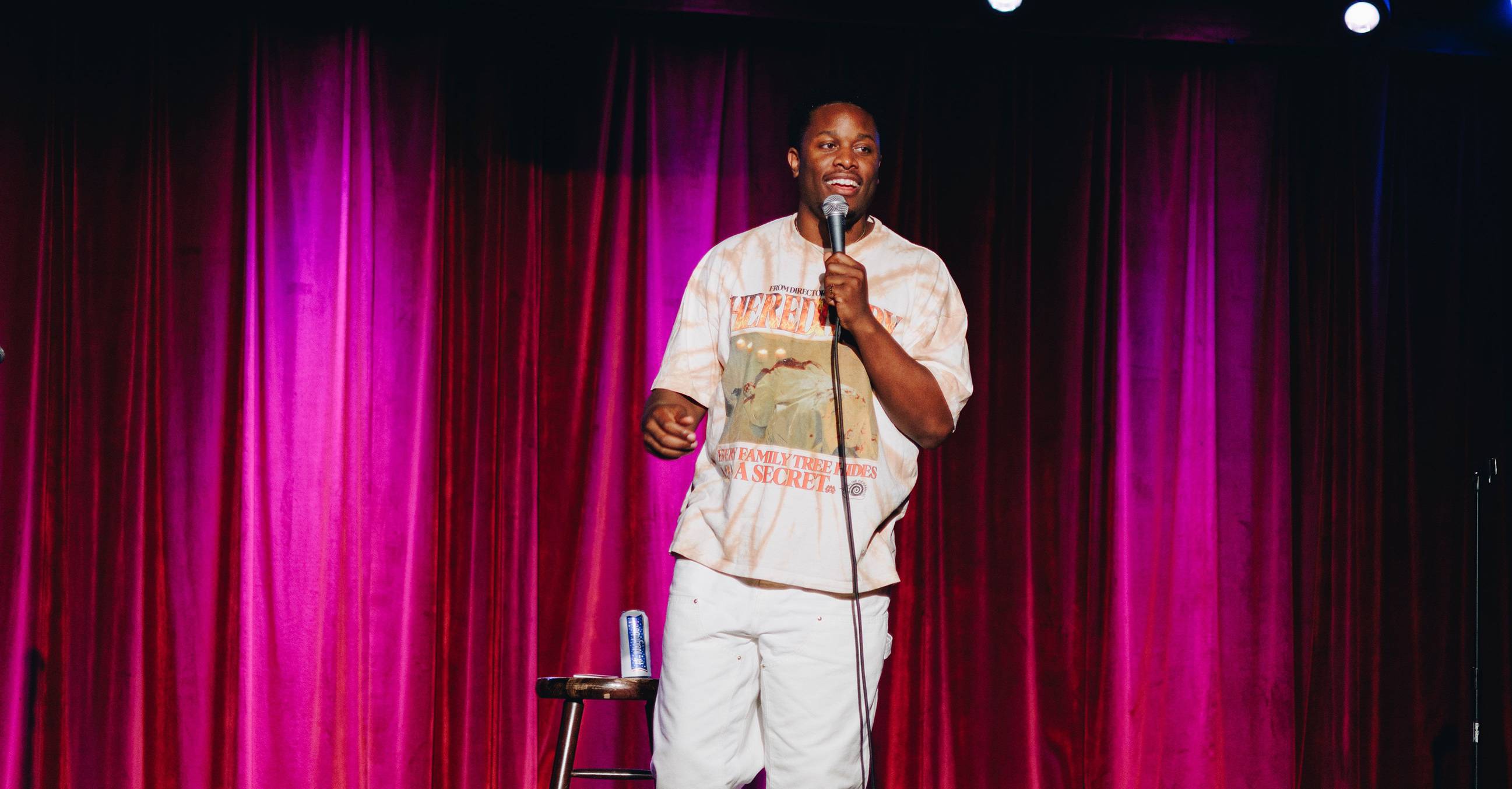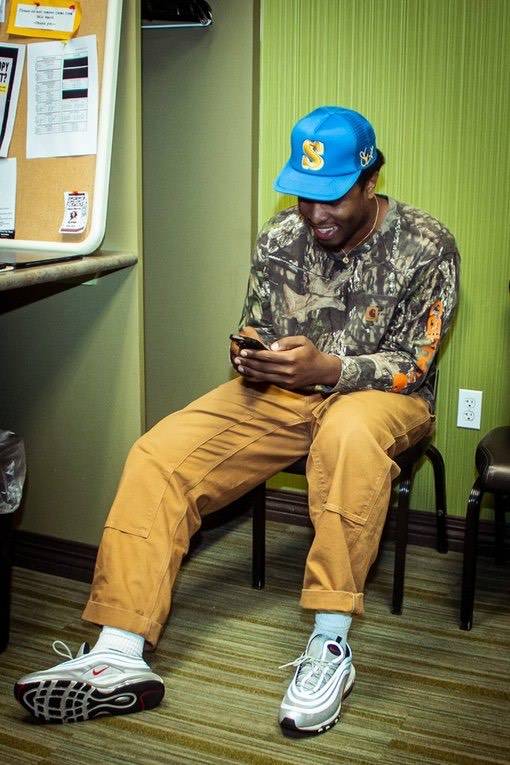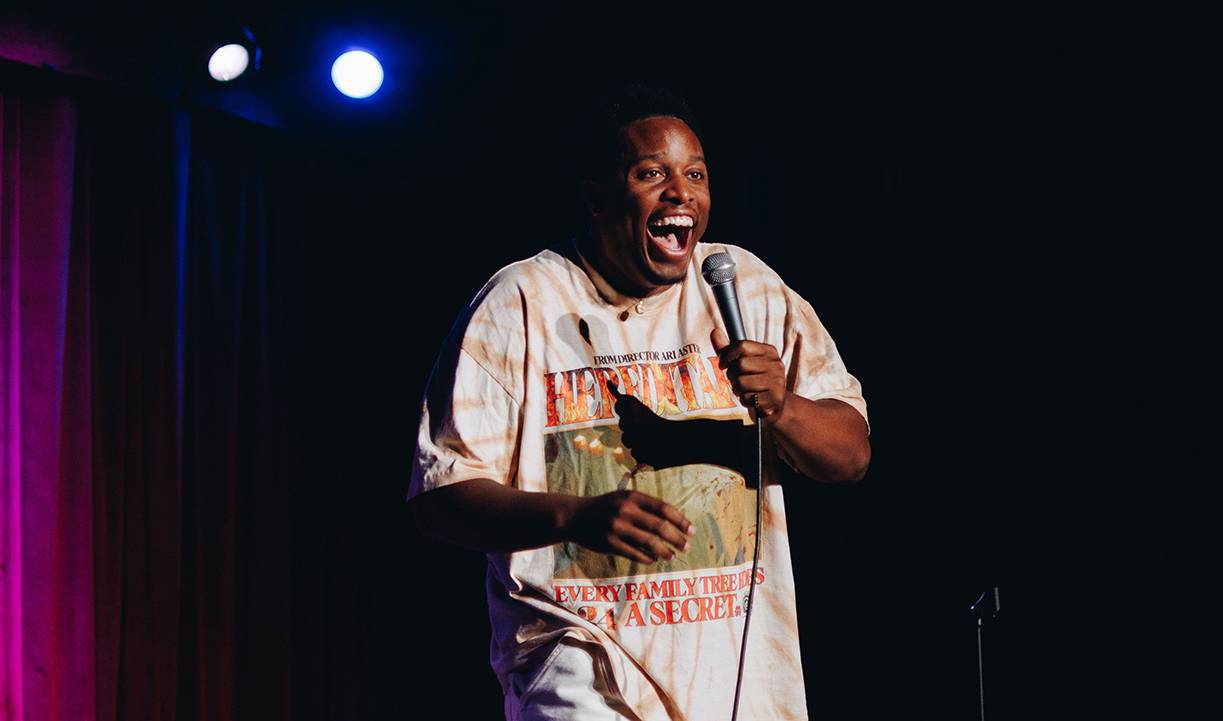Bobcat alum Devon Walker’s rapid rise to ‘Saturday Night Live’
By Matt Joyce

The past decade has been full of twists and turns for comedian Devon Walker. Since graduating with a psychology degree in 2014, the Texas State alum has held jobs as a social worker, a pants salesman, and a job candidate screener for a software company—to name a few.
But one constant has been Walker’s pursuit of his dream of working in comedy: first as a standup comedian in Austin’s comedy clubs; then with a move to New York where he wrote for internet and TV shows; and today as a cast member on “Saturday Night Live.”
Walker joined “Saturday Night Live” in 2022, cracking up audiences in roles ranging from a British rapper to an agitated game show contestant alongside celebrity hosts like Megan Thee Stallion. Walker is now working on his second season of SNL as the sketch comedy show resumes after a monthslong hiatus brought on by the writers’ and actors’ strikes.
“I’m relieved to have somewhere to be during the daytime,” Walker said of the show’s return. “And I’m excited to read all the mean comments this season. I thrive on spite.”

Walker grew up in Pflugerville and transferred to Texas State in 2010 after attending Blinn College for one year. San Marcos, he said, was “close enough to where I grew up, but far enough away at the same time.”
As a psychology major and mass communication minor, Walker said comedy wasn’t on his radar during his undergraduate years. But his TXST friends saw the potential.
“He’s always been a really funny person, somebody who people naturally gravitate toward because of his energy,” said KAB Burgess, a 2012 Bobcat alum.
Burgess roomed with Walker when they were both finding their career footing, first in Kyle and then in Austin. After watching Walker’s commitment to the standup comedy scene in Austin, Burgess said he wasn’t surprised to see Walker make it all the way to SNL.
“He was good at it, legitimately funny, and there was always momentum,” Burgess said. “He had a passion for it, too. He said, ‘Hey guys, I’m going to sell all my stuff, I’m quitting my job, and I’m going to move to New York.’ I knew he had it in him, but how quickly it happened, I think that was the most surprising part.”
During a moment of downtime in September—after wrapping up a national comedy tour and before SNL reconvened—Walker talked to Hillviews about his comedic path.
Outside of your classes, what were you involved with at Texas State?
I was working a lot at the H-E-B in Kyle. When I wasn’t doing that, I would say my key campus activity was I worked on the production of a sports show, like a panel talk show about sports. I think it was called “Texas Nation.” We recorded it in the basement of a building on campus. I know there are videos, but I hope nobody finds them. And then, this wasn’t on campus, but probably sophomore or junior year, I was an intern for “The Bobby Bones Show” in Austin. Originally, I was a mass comm major, but I swapped it out after doing the radio internship. I was like, I’m not going into this business. And so that’s what got me into being a psych major.
Was comedy on your radar during your time at Texas State?
Not in any way, shape, or form. It genuinely did not even occur to me that I could do comedy until I was probably 23 years old. It didn’t really occur to me until I was out of undergrad that it was even a possibility.
How did you first get into comedy?
I did my first ever open mic in the fall of 2014, right as I’d started grad school. [Walker earned a master’s degree in organizational development from St. Edward’s University in Austin.] But I didn’t really get into the scene and start working consistently until the summer of 2015. The first open mic I ever did was at the old location of Cap City Comedy Club, which was right off US 183. Now it’s still off 183, I guess, but it’s moved to The Domain now, so they got fancier. The old location that I started at was just a building in a strip mall next to a tire shop.

What was the Austin comedy scene like at that time?
I think the perception is, because there’s more national attention on it, that now is the golden era of the Austin comedy scene, and now it’s coming into its own. And on a certain level that might be true because probably there are more professional opportunities than used to exist. But even when I was there in the Austin scene, I always felt like it was a special time to be there. A lot of people from that time have gone on to do cool stuff too. I met Andrew Dismukes, who I work with now at SNL, at that Cap City open mic in 2014. He was in college at that time, and I was in grad school. What are the odds that two people from the same small scene less than a decade later get to be on SNL?
When did you move to New York?
I did basically three good years in the Austin scene and then decided to move to New York in 2018. And that was the first time I’d ever really lived anywhere that wasn’t Central Texas.
Were you working comedy full time?
My first job in New York was working at Bonobos, a men’s clothing company, in the customer service department. People would call in and be mad at me about pants. They’d be like, “Hey, it’s Wednesday, and my pants were supposed to be here on Tuesday,” and I’d have to soothe a bunch of software engineers who were upset. Then I got a job in HR at a software company to basically screen candidates for interviews. I was going through people’s resumes and deciding whether or not they had the right qualifications to be brought in for interviews. They shouldn’t have given me that job. I had too much power. Whoever had the most ethnic sounding name, I was putting them forward every time.
When were you able to start making a living at comedy?
My first real full-time comedy job was when I got hired to make digital online videos for Comedy Central. It was right before the pandemic in the spring of 2020. It was called the Creators Program, and there was a team of five of us writing and performing sketches for Comedy Central’s website and social media. I feel like the coolest thing that came out of it was I got to make a show called “GOAT.”
Was making the cast of “Saturday Night Live” your goal?
That was not something that I necessarily saw in front of me when I started doing standup. A lot of people, when they start working in sketch or improv capacities, they work at the big places—“Upright Citizens Brigade,” “Second City”—and SNL is their destination. That’s the end game. My goal was always just to be able to be creative for a living in whatever kind of way that happened, whether that was standup or writing opportunities or acting opportunities, I was just trying to not sell pants anymore. SNL wasn’t the explicit goal, but once they asked me to audition last year, I was thrilled for the opportunity.
Was the SNL audition nerve-wracking?
First they brought me to an audition at a comedy club, and they basically give you five minutes to do whatever you want to do. And so I tried to put together what I thought was a good five-minute set that felt representative of me. And then it was maybe a day or two later, they asked me to come do the audition at 30 Rock [30 Rockefeller Plaza, home of the SNL studio]. You have to sit there and wait for four or five hours, and that part is nerve-wracking. You just have so much time to think about how this five minutes might determine your future in some kind of insane way.
How did it go?
You do your audition on the exact same stage that the host does their monologue, and you get five minutes and there’s a camera and you’re in a mostly empty studio except for a handful of people. And they tell you beforehand, nobody’s going to laugh, so just be ready for that. We’re talking less than 10 people in the room, and they’re sitting off to the side. So I just played to the camera, and I played to the stands, the upper level, as if there were people there. And fortunately, I did get some laughs, and just hearing that sound put me at ease a little bit. It felt good.
What’s your biggest takeaway from your first season at SNL?
I think I started to really understand the importance of celebrating the victories. That place can be really challenging, especially when you’re in your first year. It’s hard to get a lot of moments. And so just trying to seize whatever opportunities you have when they come, and when they go well, really appreciate it because not a lot of people get to do this job.
When both the writers’ and actors’ guilds were on strike, you went on a national standup tour. Having been on SNL for a season, how did the tour go for you?
I had not headlined that much prior to being on SNL, but getting on SNL opened a lot of doors. I think people take you seriously in a different kind of way. And so it was definitely a good time. It was a learning experience. In some cities I’m selling out shows, and this is awesome. And then other cities, being like, “OK, so San Diego just hates me.” It sounds cliche, but touring is really about riding the highs and surviving the lows. Some shows are going to be half full because not that many people bought tickets, and some of them are going to be sold out. Some of them you’re going to crush and have a killer set and be on top of your game. And some of them you’re going to not want to do the meet and greet after because you just want to sulk in the green room. And everything in between. So the tour was definitely a learning experience. I feel like I became a better long-form comedian through that process, so I was grateful for that. I certainly look forward to getting back to work at SNL and stressing out writing sketches again. Until then, it’s mostly just touring and trying to not get fat.
What are your favorite memories of San Marcos and college life?
I thought it was cool to go to college in a real college town. In a place like San Marcos, pretty much everything revolves around the school. I was on the river as much as possible. That’s something that’s kind of basic and obvious. We were all on the river. It’s part of the lifestyle. I thought San Marcos was a cool, quaint place to live, and I have a lot of positive memories from my time there.
Do you have any ties to TXST at this point?
No, but if they’d like to give me money for anything, let ’em know that I’m definitely open to that. You’re the first person to reach out. I’ve been waiting for this moment. I was wondering, how come you guys didn’t know this sooner? I was waiting the whole season. I want to be on the Wikipedia page for Texas State, where it says notable people who have attended this university. I want it to be LBJ, and then George Strait, and then me. ★